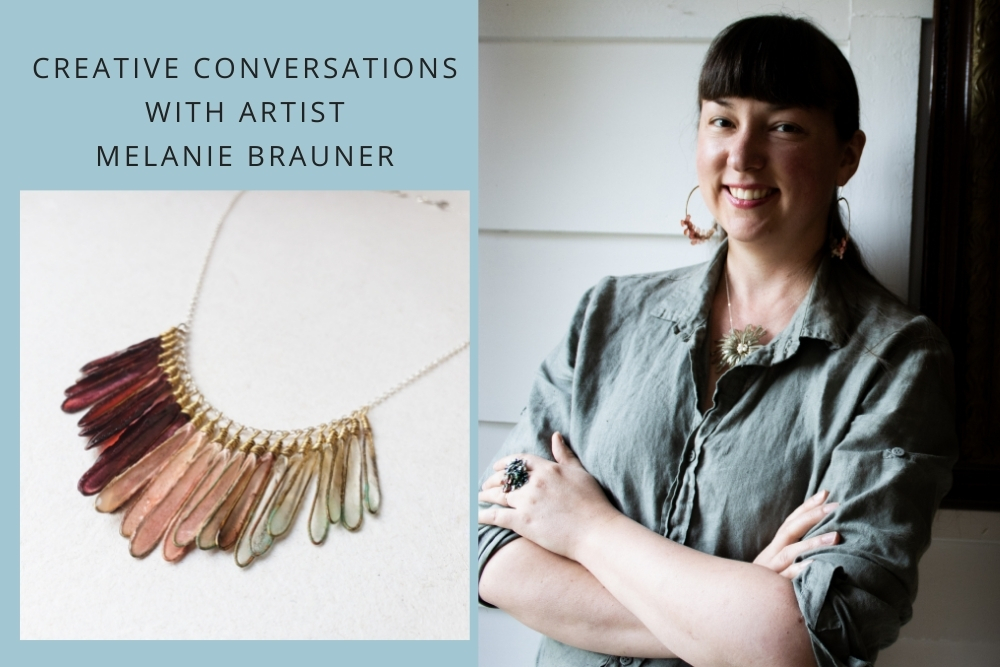Metalsmith, papermaker and artist Melanie Brauner doesn’t believe in talent. The success of her one-of-a-kind jewellery business, Verso Studio, comes from a place of kindness to herself, generosity and a genuine connection with her customers – and hard work aplenty.
Earlier this year in a blogpost about overcoming creative block, we quoted Melanie on her grandfather’s advice on inspiration (spoiler alert, there’s no such thing as “The Muse”). We were so fascinated by her unique approach to creativity and the fierce (yet forgiving) passion she puts into her practice that we decided to go back and chat with her to dive deep into all things creativity, talent and imposter’s syndrome.
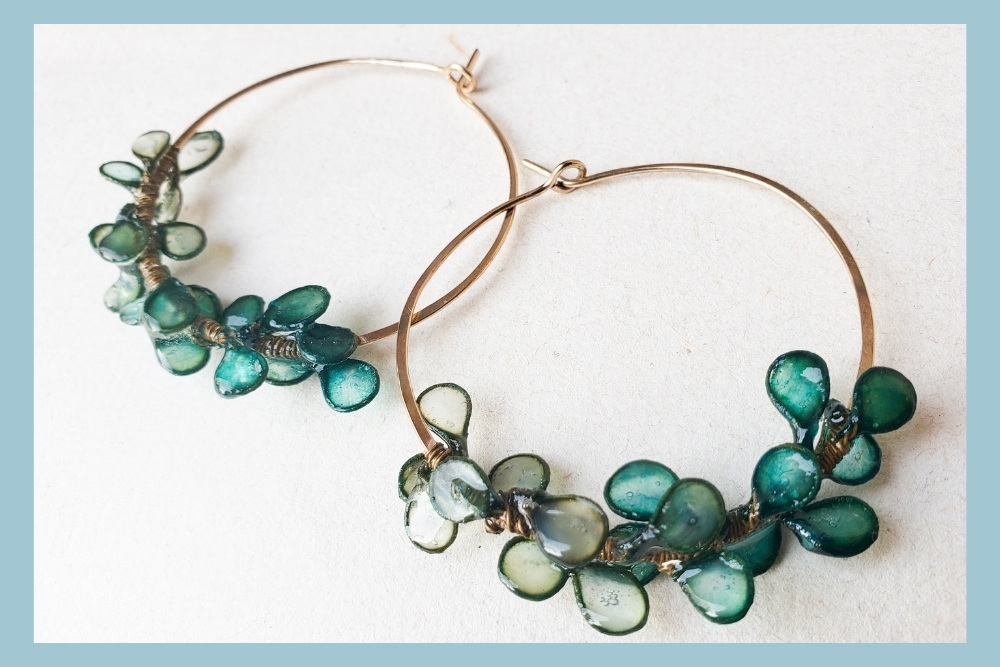
But first, a little bit about Melanie
Melanie studied book arts and metals at Oregon College of Art & Craft and currently lives in Everett, Washington, where she works at her papermaking and metals studios tucked in the back of the garden of her 1928 storybook cottage. Here, inspired by details found in the oceans and forests of the Pacific Northwest, Melanie makes jewellery from metal forms cast in handmade paper.
Beyond her beautiful work, what really drew us to follow Melanie’s journey is the content she shares on her Instagram page. Melanie’s posts are a source of motivation for creatives of all disciplines, who can feel seen and be part of a community. Prior to 2020 Melanie mainly posted photos of her pieces and rarely shared anything about herself, but recently she decided to change her approach and started filming herself and talking about the daily struggles artists face. At first it was a way of talking to herself in the mirror, but then she realized that she was not the only one struggling to keep things together and that her thoughts might actually help other creatives. And so, in her almost daily videos, Melanie shares not only behind the scenes of her jewellery making but her thoughts about creativity, talent, struggles with insecurities and imposter’s syndrome, all in a very cinematic style as her soothing voice invites us into her practice and into a more mindful, kinder life.
Here is more of our our Creative Conversation with Melanie:
I noticed that you share in your videos the step by step of how you make your pieces. As creators we tend to keep our trade secrets to ourselves, yet you are so generous with your knowledge. Why is it important for you to share that knowledge?
I get that a lot, that I share too much, and that people might steal my ideas. To that I say, “I hope they do!” I honed this technique, it took me a bunch of years, I would hate to see it die with me. That would be the ultimate tragedy. We are all individual artists, so someone could take this technique and then add their own spin to it and make their own work. And it would look nothing like mine! Essentially, they are adding to the richness of the market, not taking away any customers from me, not at all. There’s plenty of business for all of us, plenty of love for everybody to go around. I come from the fine craft tradition and you don’t keep things to yourself in the craft world; if you acquire something new you share it because it could be useful for someone else as well.
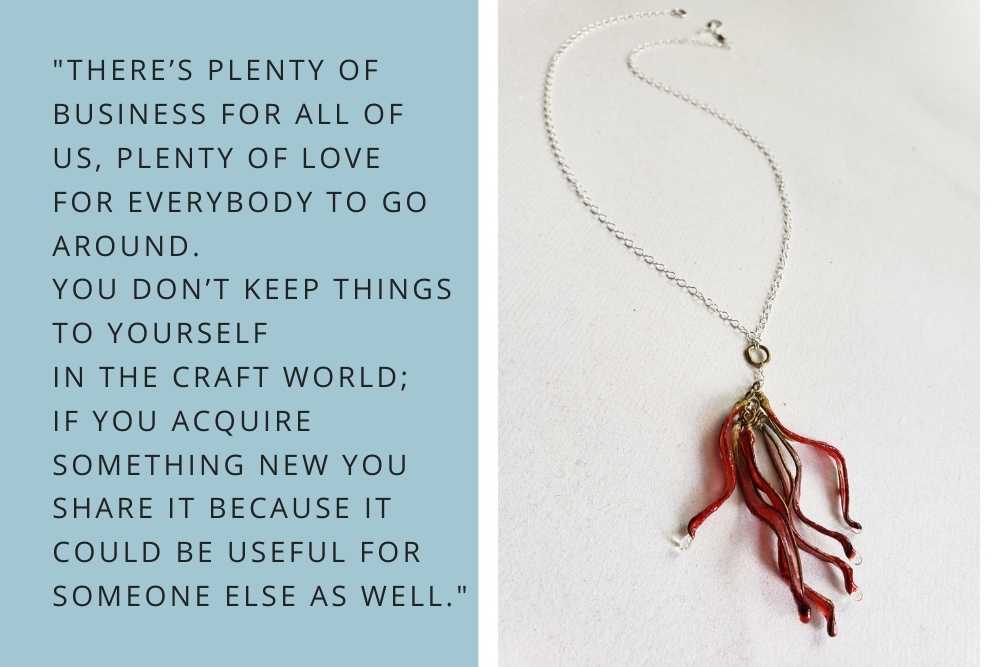
And ultimately that’s how you learned, right? How you got that knowledge in the first place when someone shared it with you.
Absolutely! I would not be where I am today if I didn’t have teachers who did the same for me. They taught me everything they had learned up to that point and I added to that; and hopefully I’ve added to what they know because I’ve been working as well.
I feel like you are breaking a lot of social constructs that we have as artists. We are so used to hearing that, in order to make it, we have to have talent. But your approach is completely different – you’ve said that there’s no such thing as talent.
That’s all in my own experience. I’m not good at things naturally [she laughs]. I mean, motor skills are very difficult to me. I’m good in my head but I’m not so good with my hands, so it takes a lot of practice to get good at something.
Really? But your work requires such fine motor skills.
Oh, you should see my early work when I started working on metals. I was terrible. I got awful grades! I was awful but I kept at it. It’s not a matter of talent, I really do believe that. I don’t think talent is a real thing. I don’t think anyone was born with knowing how to do something – you have to work for it. Some people have more aptitude, and they learn faster. I am not one of those people. I don’t have aptitude so I had to work really hard for it.
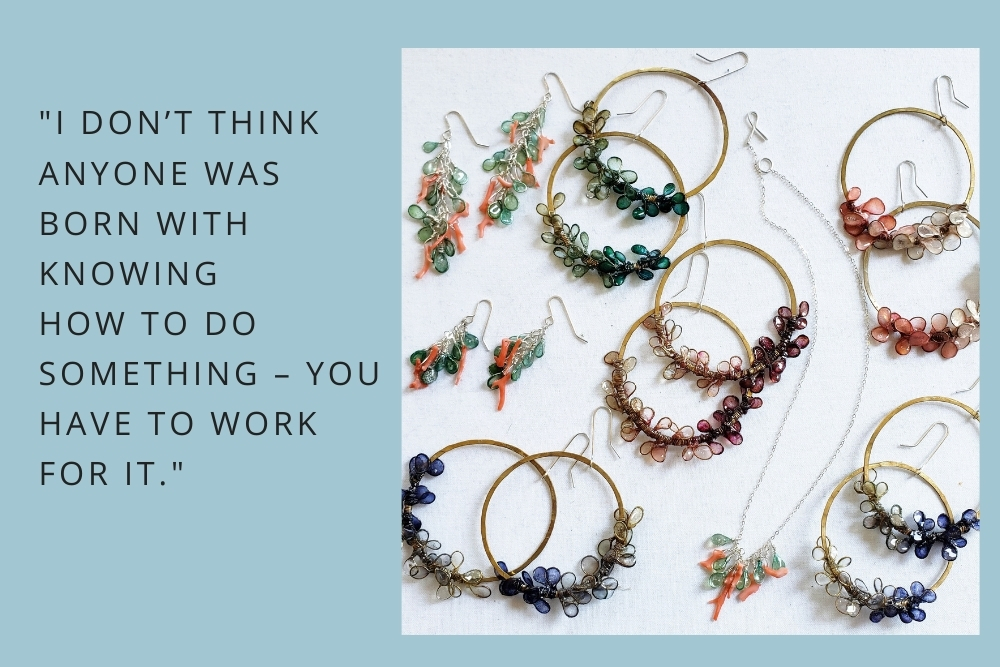
How does that work with your relationship with perfectionism?
My relationship with perfectionism is kind of bad because I feel sometimes that I have to force myself to say, “This is as good as this thing is going to be right now and I’m going to go ahead and let people see it. And then I can improve later but right now it’s good like this.” At the same time, perfectionism is telling me exactly what I need to know for getting better. It really does actually point out the truth, sometimes a really difficult truth about what could be better, and it can be painful to listen to it, but you can develop a relationship with it. You have to learn to understand that that voice in your head is not necessarily judging you, it’s trying to help you so you can listen to that voice and actually use it to get better.
You have talked a lot about imposter’s syndrome and not feeling good enough. What’s your advice for emerging and established artists to deal with that feeling?
To begin with, it’s helpful to know that everybody feels it. Most artists deal with imposter’s syndrome and honestly, the artists who don’t feel it are the ones who are so overconfident in their work that they are never going to get better. I think that imposter’s syndrome, as painful as it is, I trust it. I deal with it all the time, it gives me awful anxiety but, as terrible as it is, it actually tells you that you care so much about what you are making that it bothers you to not feel like you are part of the club yet. And you want so much to be part of that club that you’ll show up all the time trying to be better. So, it’s oddly a positive thing to notice in yourself.
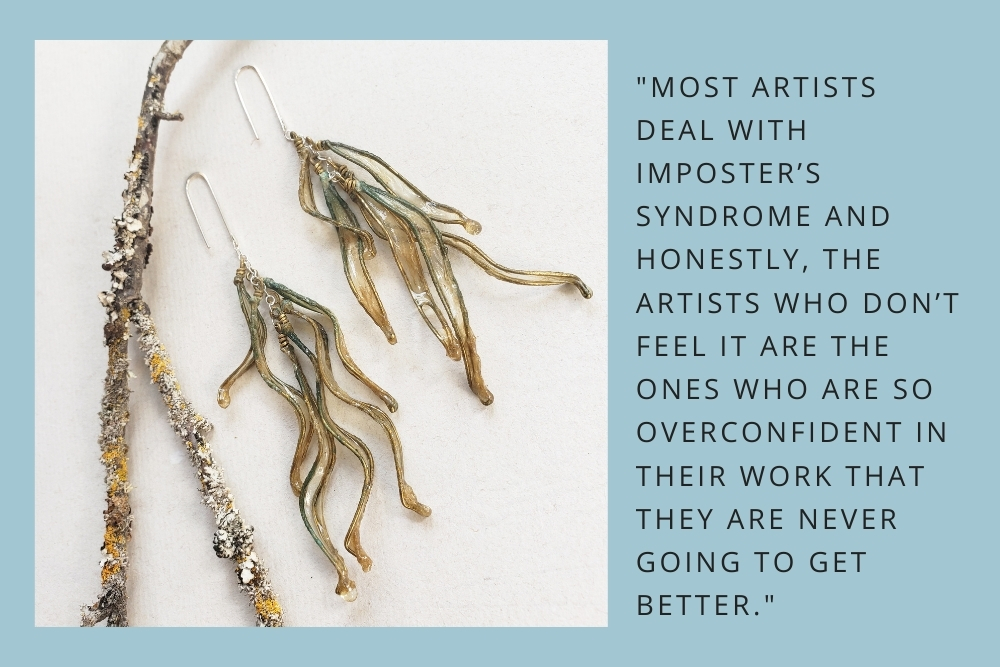
I feel like we have to own it, acknowledge it and then move on.
It’s been so powerful for me to say things out loud that I feel and that are very personal, really hard things for me. It’s been so powerful for me to say those things out loud, but the reaction from other people has been so lovely and heartwarming. I get stories all the time in my email that say, “I feel that too and here’s my story.” It’s so wonderful.
I understand handling the business part of a practice can be difficult for artists. What is your approach to that?
Yeah, artists and business don’t go well together. My huge piece of advice is to know your limitations and even if you have to go into some debt, hire someone to fill in those gaps for you early on. One of the best pieces of advice I’ve ever gotten was from a painter who told me, “What you have to do is forget what art school told you and sell out! You have to pay the bills with your art, even if that means making some stuff sometimes that isn’t necessarily what you’d love to make. But make it so you have the money and the time to make all the things that you do want to make, and eventually that will become what you do. In the meantime,” she said, “just sell out! There’s no shame!” I’ve actually made more money not trying to make money.
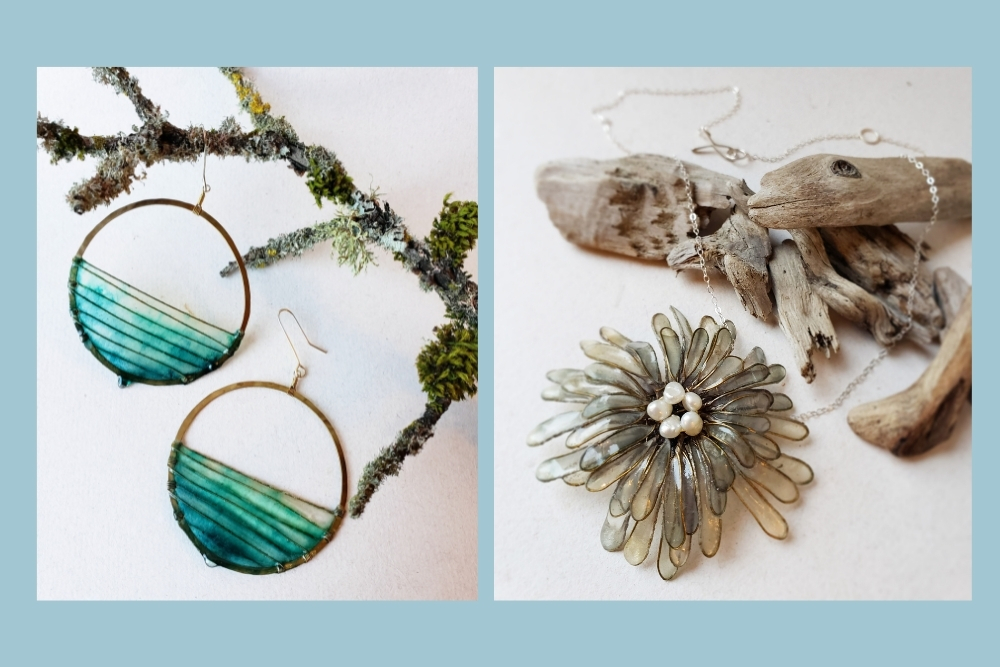
Is there anything in particular you are working on at your practice right now?
I think the biggest thing I’m working on in my studio practice right now is to play, you know? Like, really relaxing. I have a terrible guilt burden when I’m not being very productive and I’m really working on just taking it really slow. And, when I feel like it, going out and just being in nature, being quiet for the whole day and not thinking about anything. I know that it feeds my work, and being aware of that is part of my process. But’s it’s hard for me; it takes me a little while to realize, “This, right now, this is kindness for me,” and shut down the guilt! [she laughs]. Honestly, I think that the quieter, slower pace days are actually really good for a lot of artists. To slow down every system in our body, to think about what we want to do and where we want to go.
To learn more about Melanie’s work visit her website or follow her creative journey on Instagram.

